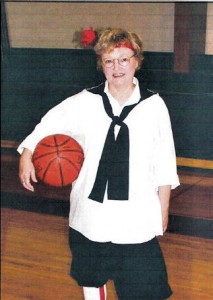What do you think when someone speaks of being “90 years young”?
I’ve always heard that expression as a cute substitute for “old.” Since the expression rarely refers to someone younger than 50, it’s at once an admission of age and a determination not to be categorized.
On NPR’s August 9th Weekend Edition, in a story entitled “Remember: The Ball is Your Friend,” essayist and “literary activist” E. Ethelbert Miller tells about his 59-year-old wife’s decision to play basketball for the first time in her life. In passing, he mentions that the “challenge” he and his wife face is “being 60-young instead of 60-old.”
So I’m not the only one!
Somehow, the number 60 motivates some of us to stop and ask, “Will I be 60-young, or 60-old?” It seems to be a time for decision: ”From here on, will I travel down a decline, up an incline, or just try to keep the road as level as possible?”
Trying to keep the road level is to hold on to the status quo, to maintain your standard of living, your present level of health and activity. It is saying, “I can relax now. Life is good; I want it to stay just this way.”
That seems reasonable, but is it possible? Can I hold onto a job using only the job skills I’ve always used? Can I maintain my level of health without exerting some effort? Can I eat the same amount I’ve always eaten without putting on pounds? Can I guarantee that family circumstances will remain the same?
Trying to keep the road level could also be, “Life may not be the way I want it, but there’s nothing I can do about it.” In essence, this is the same thing as choosing to decline.
I try to avoid using expressions such as “at my age” or “I’m too old” as a reason not to try something new. Because somewhere, someone my age is getting on a bicycle for the first time in 45 years, or learning to swim, joining a women’s basketball team or starting a new business. Obviously, age has nothing to do with it.
In last summer’s Olympics in Beijing, 41-year-old American swimmer Dara Torres not only won the gold medal for the 50-meter freestyle event, but set a new world record. Her philosophy? “Age is just a number.”
Does she have to train differently than her younger competitors? Of course. Because there’s no denying that aging causes certain physical and mental changes, even deterioration, beyond our control.
At age 85 or 90, getting out of bed may be the biggest challenge to an arthritis-riddled body. I hope I’ll be blessed enough to find out. Until then, I’m determined not to take the downward slope into old age, nor to accept the status quo.
Will it mean leaving my comfort zone? Absolutely! You can’t reach the mountaintop unless you climb.
What do you think? Is it possible to maintain the status quo without extra effort? Is it foolish to think we can still have our choice of challenges into our 80’s and 90’s?


I just recently heard the phrase “You never reach the top by falling there.” For all of us, “the top” may mean something different, but it requires effort. Now that I’ve reached 60+, I remember all the older people in my life who remained “themselves,” full of smiles and wisdom and optimism, and marvel at how effortless they made it seem. I understand the price a little better, now, the halting yourself right before you complain of pain, or the effort to connect with someone NOT your peer, that requires a little extra thought.
Great point, Yvonne! I wonder if their optimism was a conscious choice, or if it just comes naturally to some people, either by nature or by habit?